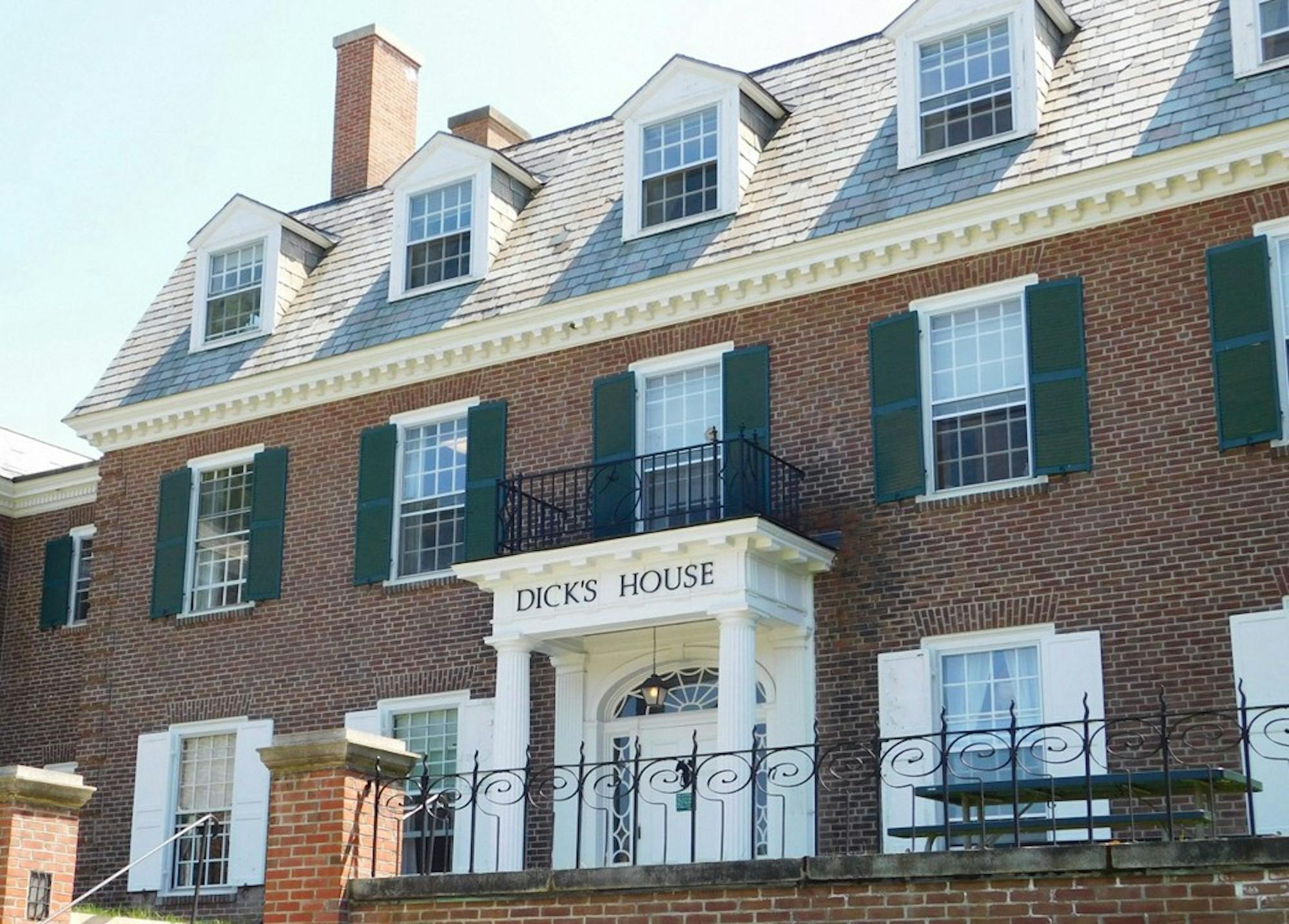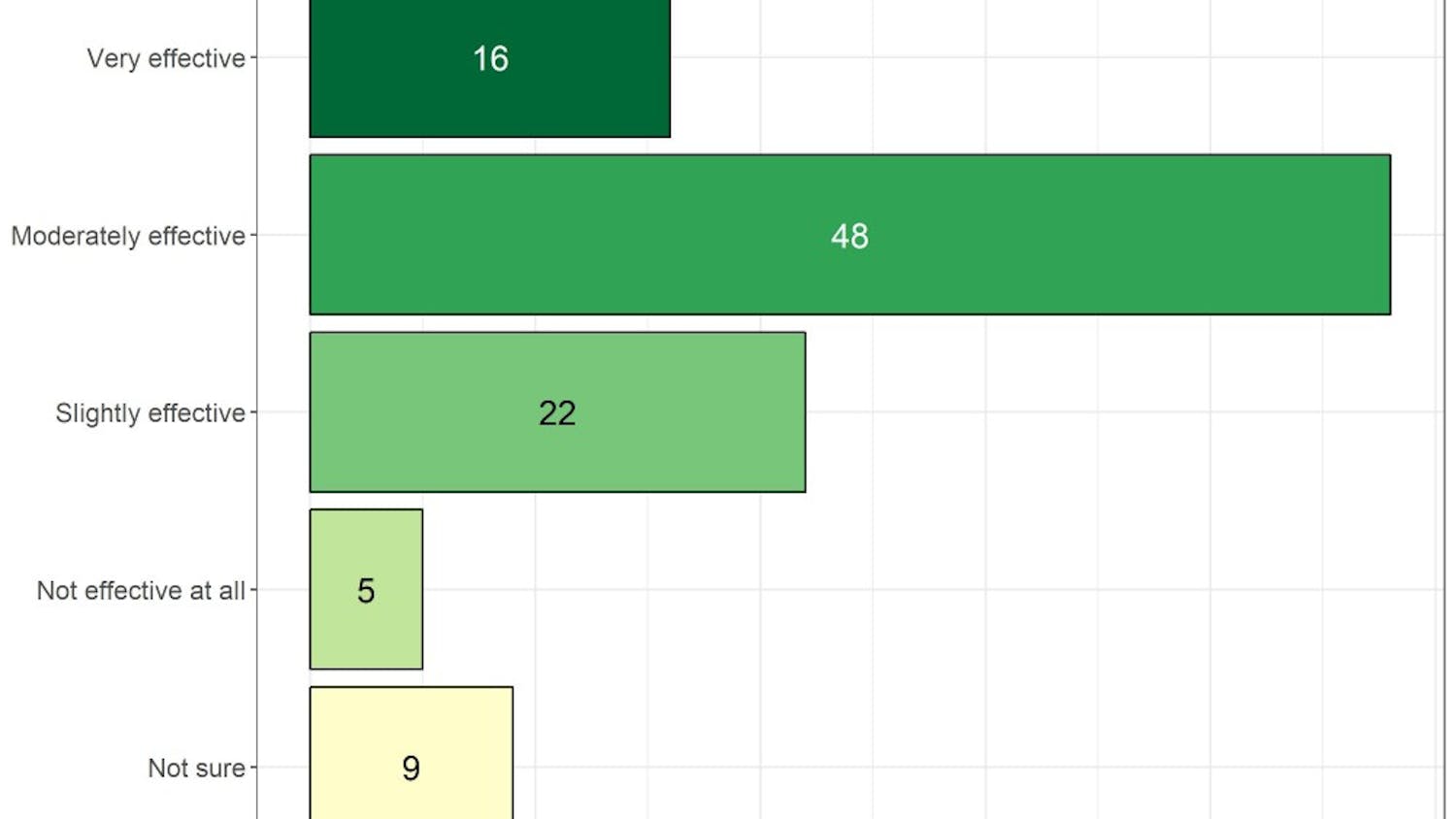Two students stumble down Main Street one night in the fall of 2018. At the bright lights of the Irving Oil gas station, one collapses, having had too much to drink. Their companion, concerned for their now-unconscious friend’s safety, makes a Good Samaritan call to Safety and Security and carries them to the road in front of Collis.
Today, the Good Sammed student has hospital bills that total over a thousand dollars, hours in a local juvenile court diversion program, an arrest record and a rejected undergraduate advisor application — but no criminal charges or on-record violations of the alcohol and drug policy.
Such is the complicated situation surrounding Dartmouth’s “Good Sam” policy. Designed to alleviate students’ hesitations in making an emergency call for another student’s safety, the policy states that “students and/or organizations that seek assistance from [the Department of Safety and Security] and/or emergency services and the individual(s) assisted will not be subject to College disciplinary action with respect to violation of the Alcohol Policy and/or the use of other drugs.”
“[We want] the focus to be on students getting the medical help they need, rather than being super focused on what the judicial consequences might be,” said director of judicial affairs Katharine Strong, who was involved in an institutional review of the policy in 2017.
Yet students can still face legal trouble when outside Safety and Security’s jurisdiction — for example, the road in front of Collis, which is in the jurisdiction of the town of Hanover, not the College. Arrest records in the town of Hanover are publicly available online. Additionally, nothing in the policy prevents a student from racking up expensive hospital bills at Dartmouth-Hitchcock Medical Center.
A Good Sam call is also logged by the College, and that log can be used by other departments and offices “for purposes of determining eligibility, membership, certification, employment, internship and/or associations with Dartmouth College.”
According to data from the Student Wellness Center, there were 117 Good Sam calls in the 2017-18 school year, a drop from 131 in 2016-17 but still an increase from 96 in 2015-16. Fall term tends to have the most calls due to a larger student population on campus and the new class of first-years, according to Wellness Center director Caitlin Barthelmes.
What initially happens when a student makes a Good Sam call from campus is fairly straightforward, according to interim director of safety and security Keysi Montas.
Initially, Safety and Security may take no action — “we might let them go, walk them to their dorm and have them sleep it off on their own,” Montas said. Sometimes, Safety and Security puts the intoxicated student into the custody of a sober friend. They provide the friend with a sheet of care instructions “with the clear understanding that, if the person gets worse, call us back.”
If Safety and Security is unable to make a determination regarding a student’s intoxication level, Dartmouth Emergency Medical Services is called in to make the determination and advise Safety and Security as to what the best next step would be — including if the student should be taken to Dick’s House.
When a student arrives at Dick’s House, they are assisted by a nurse, who then determines whether the student is “medically stable enough” to be at Dick’s House or whether they need to be transferred to DHMC, said Dick’s House associate director Bryant Ford.
“If someone’s blood alcohol level is acutely high, they might need medical attention,” Ford said. “If a student is unresponsive — significantly unresponsive — we are not equipped to deal with them here.” He added that if a student sustained a significant injury, such as a fall, that may also be better handled by DHMC.
Finally, if a student is incoherent, throwing up, unable to stand or in even worse condition, Safety and Security will call an ambulance and transport the student directly to DHMC, which is better-equipped than Dick’s House to address heavy intoxication.
DHMC senior director of external relations Rick Adams said in an email statement that “once a patient comes through our doors they are treated like all other patients, regardless of how or by whom they are brought to us.” DHMC does not track statistics related to the Good Sam policy.
It is the cost of an ambulance ride and a stay at the hospital that raises a red flag for some students. When the collapsed student near Collis, who was granted anonymity for this story for privacy reasons, was taken to DHMC, he received an initial bill of over a thousand dollars — though most of it was covered by insurance, according to the student who was Good Sammed.
The student that made the Good Sam call, who was also granted anonymity for this story for privacy reasons, said that he tried to convince Safety and Security to take the unconscious student to DHMC in a Safety and Security vehicle instead of an ambulance to save money.
However, it is College policy to provide transport to the hospital in an ambulance, according to Montas.
“In order to provide continuity of care, when it is determined that a person needs a higher level [of] medical care at the hospital, that transfer must happen via [a] trained and equipped carrier (i.e. ambulance),” Montas wrote in an email statement.
“That is … something that they do not clarify at all [in public information about the Good Sam policy],” the student that made the Good Sam call said. “If your friend is in a condition where you think you have to Good Sam them, then there will be repercussions because he or she will have to go to the hospital … you’re not going to Good Sam your friend unless they’re unconscious, really.”
Matthew Shearin ’19 agreed, stating that the bill that comes with being Good Sammed policy is “not light.”
“That could be another detriment, especially to students here on financial aid,” he said.
June Dong ’22 said that she is concerned for students who may utilize the policy too often, given the costs associated with hospitalization.
“If you were okay, then it’s kind of annoying to have that extra cost put on you when you weren’t in a dire situation,” Dong said.
When asked about the costs of a Good Sam call, Ford said that he “would hate for finances to get in the way of a student needing medical attention, especially if it can help save a life.”
He clarified that Dick’s House and the College have no control over what the hospital charges.
“No one goes into a night thinking ‘I’m going to end up with a hospital bill,’ but I do think students may engage in behaviors that are pretty high-risk,” Ford said. “If that is the case, we want to make sure we’re getting them the proper treatment, and in some cases that proper treatment means going out to DHMC.”
Montas was more blunt with his words: “If you drink to the point at which you need an ambulance, because your life and health might be at risk, a thousand dollars is pocket change to me,” he said.
Montas also stressed that violations of other College policies or New Hampshire law in the course of a Good Sam call can result in additional penalties.
“If you are drunk, and before we get there you break something and you punch somebody, the Good Sam call will exonerate you for the alcohol violation, but not for the property damage, not for punching somebody,” Montas said.
Strong noted that the Good Sam policy was expanded in 2017 to cover intoxication via substances other than alcohol. She cautioned, however, that the Good Sam policy only applies to substance use.
“What there would be consequences for are things like possession of drugs, dealing, that larger … impact of drugs on the community,” Strong said.
She added that there has never been a drug-related case in which a student had been reprimanded for other related violations, and that often, the office of judicial affairs will call a student in for a “Good Sam Plus” conversation about policy concerns.
“They are not judicial conversations; they are Good Sam conversations,” Strong said. “We want to help the student to understand the policies that we want them to follow in the future.”
This entire process may go differently if one is not on College property, like the students on Main Street that fall night in 2018.
“The Good Sam policy doesn’t apply to Hanover Police,” Montas said. “Jurisdictionally, when you talk about the geography, it is complicated.” He gestured around his office, located above Dick’s House. “I can say that this is Dartmouth property. You get down the sidewalk and the road, that’s town property. You go across the street, that’s Dartmouth property,” he said. “We are an intertwined mesh.”
This distinction means that if a Good Sam call is made from off campus, Safety and Security will contact Hanover Police. The two organizations often respond together if the situation involves a community member. However, as soon as local law enforcement is involved, students are open to legal responsibility.
The anonymous student who made the Good Sam call said this is an area of misunderstanding among Dartmouth students.
“[This] is something they do not clarify or explain,” he said. “If I had known, I would have just taken [the unconscious student] up the steps into Collis.”
Hanover Police captain Mark Bodanza said that the department tries to adhere to the “tenets” of the Good Sam policy.
“We want people to be able to feel like there are barriers removed, even fears removed, but we also understand that we have to balance that with our law enforcement mission,” Bodanza said.
The student who was Good Sammed was charged with unlawful possession and intoxication. Through a program through Valley Court Diversions Programs, however, he was able to avoid a criminal trial and a criminal record.
“[The diversions program] circumvents a court finding on their record,” Bodanza said. Intended as an incentive to change behavior, as soon as the program is completed successfully, the charges are removed.
The diversions program is not free, however. The student who was Good Sammed said he paid $280 to participate, and said that getting to and from the program is “very inconvenient” because of the bus schedule.
Bodanza clarified that the record of the arrest is still present in online, publicly-available police logs because an arrest record is distinct from a criminal record. However, the arrest record would not surface for employment purposes and background checks unless the individual applied for a law enforcement job or a job that required a security clearance.
Regardless of whether or not a Good Sam call is made from on or off campus, most students that are Good Sammed still have to complete the Brief Alcohol Screening and Intervention for College Students — or BASICS, program — administered by the Wellness Center. Consisting of a brief survey followed by an interview with a Wellness Center staff member, the program is “evidence-based” and the “gold standard” in prevention education, according to Barthelmes.
“Part of the conversation is helping the student think through their decisions around alcohol and other drugs,” Barthelmes said. “We also recognize that those decisions don’t happen in a vacuum, and so it’s also a space for students to really think through their values, who they want to be in the world and whether or not their choices with substances are aligning with what they want to be doing.”
All students who have a Dartmouth report for an alcohol-related incident, including Good Sams, are invited to complete the program, though it is not mandatory in every case. Unlike the diversions program, the BASICS program is free of charge.
There are other downstream consequences of a Good Sam incident. While they are protected from violations of the alcohol policy, students may be required to report a Good Sam call on applications for College-related organizations or activities.
The student who was Good Sammed in the fall applied to become a UGA this spring and was required to report the incident on his application. He was rejected explicitly because of the incident, according to the email he received from the UGA Selection Committee, which stated that “because your incident has happened quite recently (within this academic year), we feel it would be difficult for you to serve [as a UGA] the coming year.”
The Office of Residential Life states on its website that the majority of candidates that have legal or College policy violations will be disqualified, but adds that “Residential Education values the potential for students to learn from their mistakes” and that they may seek an explanation from the student. The Good Samaritan policy is listed under sanctions that must be disclosed.
The UGA Selection Committee did not reply to requests for comment.
Ultimately, the Good Sam policy can only function if students are willing to make Good Sam calls, and some students indicated that misconceptions around making the call can be prohibitive.
“I think it only works if people know about it, and I think a lot of people have a lot of misconceptions about what’s going on,” said Alec Cobban ’19. “A lot of people have the feeling that if they call in a Good Sam, it’ll blow back on them, which, in the theory of the Good Sam policy, shouldn’t happen.”
Shearin expressed doubt that the policy is effective given its coexistence with the College’s hard alcohol ban, which he suggested may lead students to believe they would be punished for possessing hard alcohol if they called a Good Sam.
“If there’s been hard alcohol involved, hard alcohol in the room, not wanting to get in trouble or get on probation is a huge deterrent [to calling],” Shearin said.
Outgoing student body vice president Nicole Knape ’19 said that educating students about the “intricacies” policy would go a long way, and pointed out that members of the Student Assembly tabled in Collis the Wednesday and Thursday afternoons before Green Key from 3 p.m. to 5 p.m. to answer student questions.
“If representatives from Dick’s House were to do the same around campus every so often, I think it would be helpful,” Knape suggested.
When asked whether the Good Sam policy works as is, however, she declined to comment.
Dong said that if she were in a potential Good Sam situation, she would appreciate the call, despite her doubts about the policy.
“I would want someone to put my health first, my wellbeing first,” she said. “Ultimately, you can’t buy your life back.”




